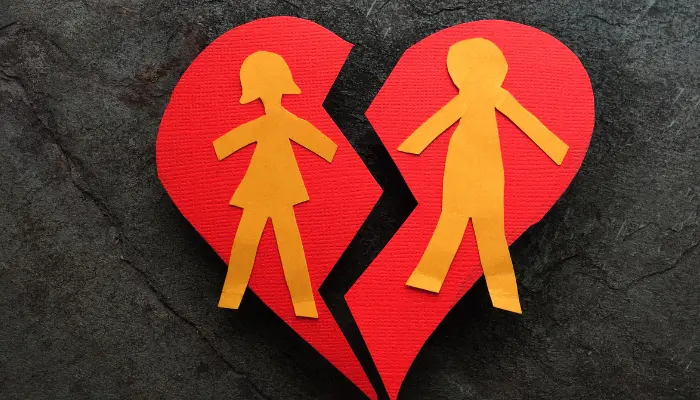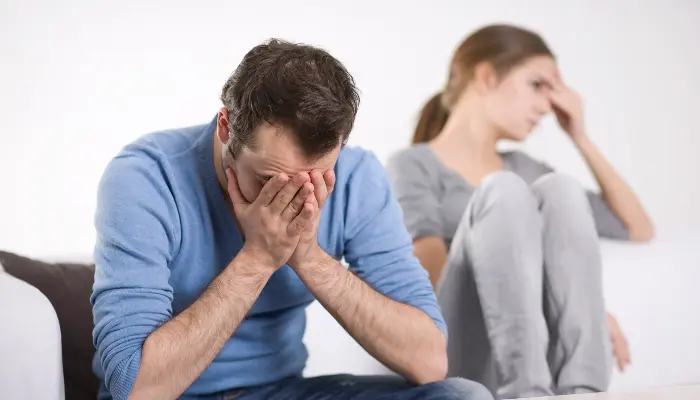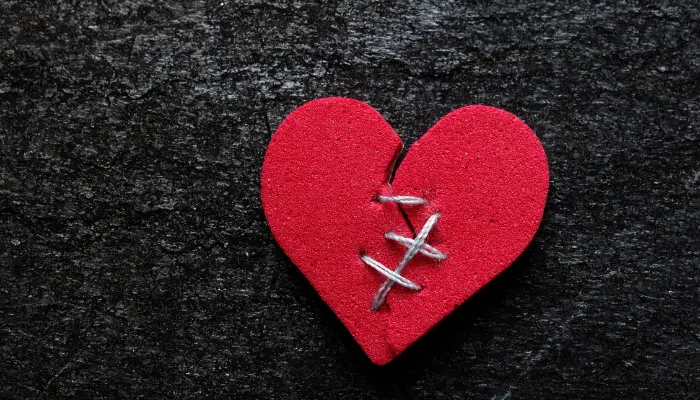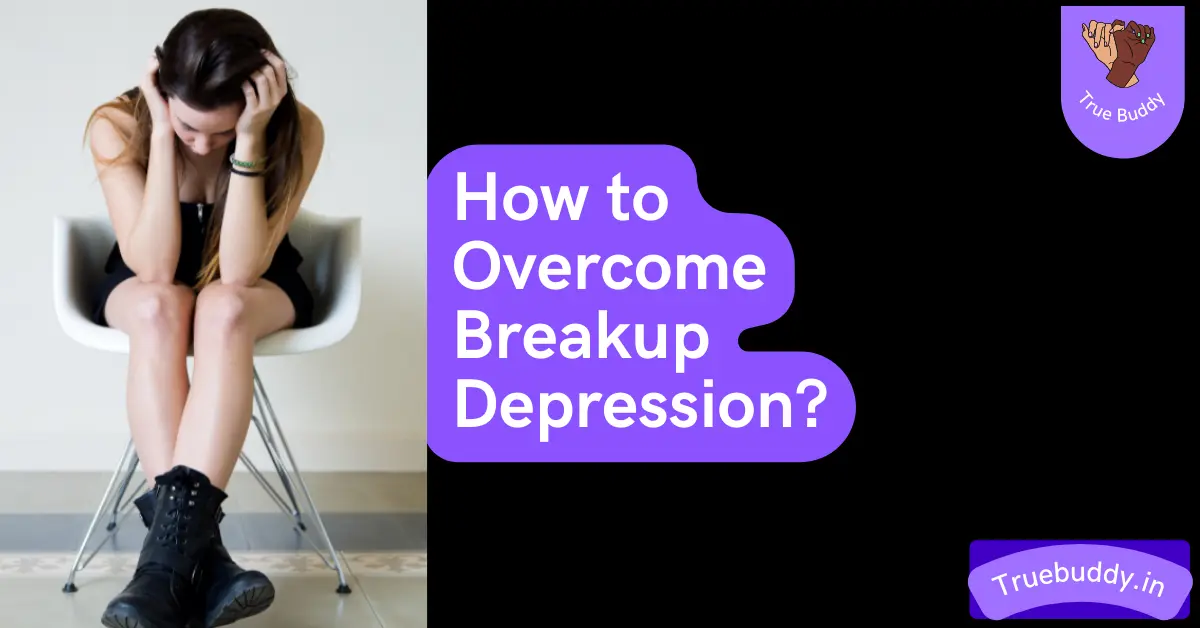Breakup depression can be heart-wrenching. Accepting the fact that the other person will not be with you anymore may be harrowing. The concept of two bodies and one soul in your head suddenly seems like a mere deluder. You see that the soul is ripping apart into two. You want things to get back to how they originally were, but you’ve already sensed that they can’t be undone anymore. All this emotional and mental stress can unknowingly set off depression.
Depression is not the ideal solution to deal with the breakup situation. It can take a toll on you without you even knowing about it.
Don’t worry; you’re not alone in this. In this blog, we’ll discuss in detail how a breakup leads to depression, how one can identify it, and at last, some tips that’ll help you get over a breakup.
How Does a Breakup Trigger Depression?

Before understanding how a breakup leads to depression, we must know what depression is. In layman’s term, depression is a mood disorder that can lead to a continuous trail of problems that initially looks petty and common but can be alarming in the long run. These problems include persistent fatigue, prolonged headache, muscle ache, etc.
Adjusting and accepting are two crucial things that can shun depression or trigger it. It gets quite a task to adjust to a new situation after a breakup when you know that you won’t share those intimate moments with your partner again.
Let me tell you something from my personal experience; breakups aren’t easy. They take away your mental peace and your social well-being. You have this feeling of emptiness within you all the freaking time. You don’t feel like eating, you don’t feel like socializing or talking to anyone, and you lose interest in day-to-day affairs and think about how to be one with the other person. When overlooked, stress, anxiety, emotional rush, and irregular habits may lead to depression.
Is It Depression or Sorrow?
This gloomy phase of a breakup isn’t that easy to tackle. Everyone who goes through a breakup is not necessarily bound to go through depression or its symptoms.
Moreover, people going through depression-like symptoms may not necessarily experience depression; nevertheless, they are susceptible to it.
Many times, it is just the grief we are going through, and you know what, it’s completely okay and understood. For instance, if a person feels sad, broken, unworthy, hopeless, and even go through a mild headache, temporary insomnia, or loss of appetite, they cannot be said to be undergoing depression. But make sure if any of these symptoms last for more than two weeks, you need to look forward to an appropriate diagnosis and consultation.
How to Figure Out You’re Going Through Breakup Depression?

If the feeling of sadness persists for a relatively long period with other symptoms, it’s a clear signal of something wrong going with you. If you are undergoing or experiencing any of these following symptoms in the long run (it’s said to be for more than two weeks ), it can be a matter of concern –
- You feel miserable and gloomy continuously for several days.
- You have this feeling of incompleteness as if you are missing out on something major.
- There is this constant remorse; it’s time you’re either blaming yourself or the other person for your current situation.
- You don’t feel like doing anything / you lose interest in every activity you used to perform enthusiastically.
- You may either be facing a loss or an increase in appetite.
- Anxiety and stress levels adversely increase.
- You may be suffering from insomnia/sleeping disorders.
- Your body feels weak as if your energy level is decreasing.
- There is a mild headache every time, which is quite irritating.
- You might get frustrated on petty issues.
- There are these persistent suicidal thoughts or suicidal ideation.
- Your decision-making capability is hampered to some extent.
Also Read:
- How to Overcome Anxiety Disorder By Improving Eating Habits
What If This Breakup Depression Goes Unnoticed?
On perceiving the symptoms early, it gets easier to come out of it by taking mindful steps. On the other hand, if depression goes unnoticed, it can ruin your physical, mental, emotional, and social well-being. A depressed person lies in the proximity of falling for drugs and alcohol, which will provide the person with a temporary escape but will acutely affect their overall health.
Panic attacks are one of the most common problems people face when they are depressed. Persisting suicidal thoughts can be very dangerous for oneself. Moreover, the relationship with other people also gets hampered.
How Do Tame This Unwelcomed Fuest (Breakup Depression)?

Now, all this boils down to how one can overcome breakup depression. We have come up with the best possible ways that can help you in the same:
Here are the 11 Possible Ways to Overcome Depression after Breakup
1. Keep Yourself Occupied
Keeping yourself busy doesn’t mean overburdening yourself. Occupy yourself by doing things you love or have always wanted to do. This can be reading books, taking projects you always wanted to work on, going for a walk, or anything else. Make sure you are not too harsh on yourself.
2. Practice Meditation
Meditation can be a very powerful tool to cope with breakup depression. There are several ways to practice meditation. You can exercise this by either focusing on your breath or mantra chanting. Several studies have shown the positive effects of meditation on depression.
3. Get Physically Active
Research has shown the miraculous effects of exercising to mitigate stress and anxiety post-breakup depression. It is because a feel-good hormone is released while exercising. All you have to do is jump out of your comfy bed and exercise, for god sake.
4. Avoid Isolating Yourself
Make sure you are socializing and not just sitting in one corner of the room, grieving. Catching up with your family and friends will help you escape the feeling of self-built loneliness. You’ll soon realize that you have so many support systems always with you, no matter how bad the time is for you.
Visit your old buddies who have witnessed your prior breakups. Your family will always love you, whether it’s your spring days or biting cold days. Remember, they love you unconditionally.
5. Shun Negative People
Make sure you are maintaining a good freaking distance from people who are always judging and condemning you. They won’t make your depression any good.
6. Try Getting a Sound Sleep
Having or maintaining a good sleep cycle will help you fight depression. Make sure you’re neither sleeping too much nor too less.
7. Track Your Thoughts
Tracking thoughts is considered to be a good practice to stay sane. Journaling is one practice that is highly recommended. Writing your thoughts down helps you to understand them better. Scrutinizing them helps you to cope more effectively.
8. Maintain a Gratitude Diary
I know this sounds stupidly insane, but I will suggest you try this once. Noting down things you are grateful for will accelerate your recovery. This small yet effective practice will create hope for a better and bright future.
9. Stay away from the social networking websites
Try shunning the social media sites for the time being, as you would always know how or what your ex is doing through his social media profile. This might lead to emotional overflow and prolonged sadness.
10. Join a Support Group
Look out for a local support group. Knowing people’s experiences will help you to find a solution for yourself. It will help you to come out of the loneliness.
11. Travel with Your Family or Friends
Explore places and new enticing sights. Go to the hills and behold the beauty of the region. Nature is a natural therapist; connect with it. Introspect more. Try finding the purpose of your life.
Conclusion
Remember, depression after a breakup is normal. The sadness and unworthiness at this phase are natural. All these remedies or tips or solutions, whatever you call them, when followed heartedly, can aid you against breakup depression. If it isn’t getting any better, make sure you consult your therapist or a psychologist.
You May Also Like:
- Use these Pigmentation Removal Creams for a Spot-less Skin
- What are the Home Remedies for Dry Skin and Acne?
- How to Overcome Anxiety Disorder By Improving Eating Habits
